PLAYTOPIA
SA gaming developers confront their reality outside the virtual worlds they create
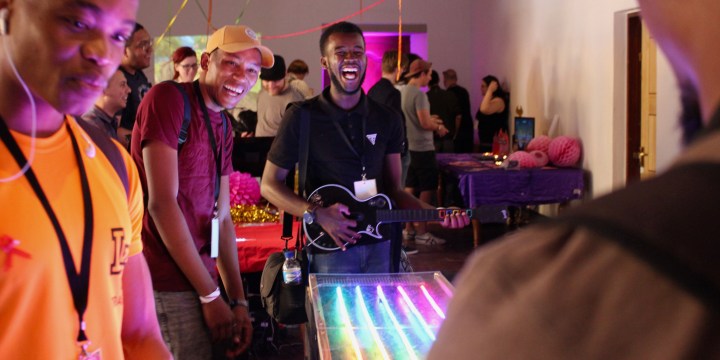
Cape Town hosted the first Africa Games Week from 28 November to 2 December 2018, where the growing South African independent gaming industry assembled to discuss turning ‘privilege into code’ and how to make sure anyone can make games, no matter who they are. The highlight of the week, the interactive festival Playtopia, was designed to bring developers and gamers together to plot the path forward.
Bulelani Temba’s intense concentration is reflected on his face. His tongue is tucked into the corner of his mouth as he fends off his friend, Phalo Matwa. Matwa’s fingers move like magic, but Temba is too quick for him — this round of Guitar Wizards goes to his opponent.
Matwa shakes his head, laughing, as he hands his guitar console to Temba’s next challenger. The two friends have played Pacman, then PlayStation and now an original South African indie game together. But in their township in Paarl, they say there is no gaming hall like this one. They’ve only seen it on TV.
The Super Friendship Arcade pop-up gaming hall is just one part of the Playtopia festival, held at the Castle of Good Hope in Cape Town. The festival is part of Africa Games Week, an umbrella name for an independent video game developers’ conference full of talks, workshops and a festival. It is like fashion week, but for anyone involved with independent game development.
Game development is a booming industry, but it’s hard to tell how much of the boom involves independent developers. There are 29 professional studios in South Africa, which employ 255 people. Independent game development is usually characterised by a small team not funded by a game publisher. The games they produce tend to be short, smaller in size and have stylised graphics. As a result, they tend to be cheaper to buy and easier to distribute.
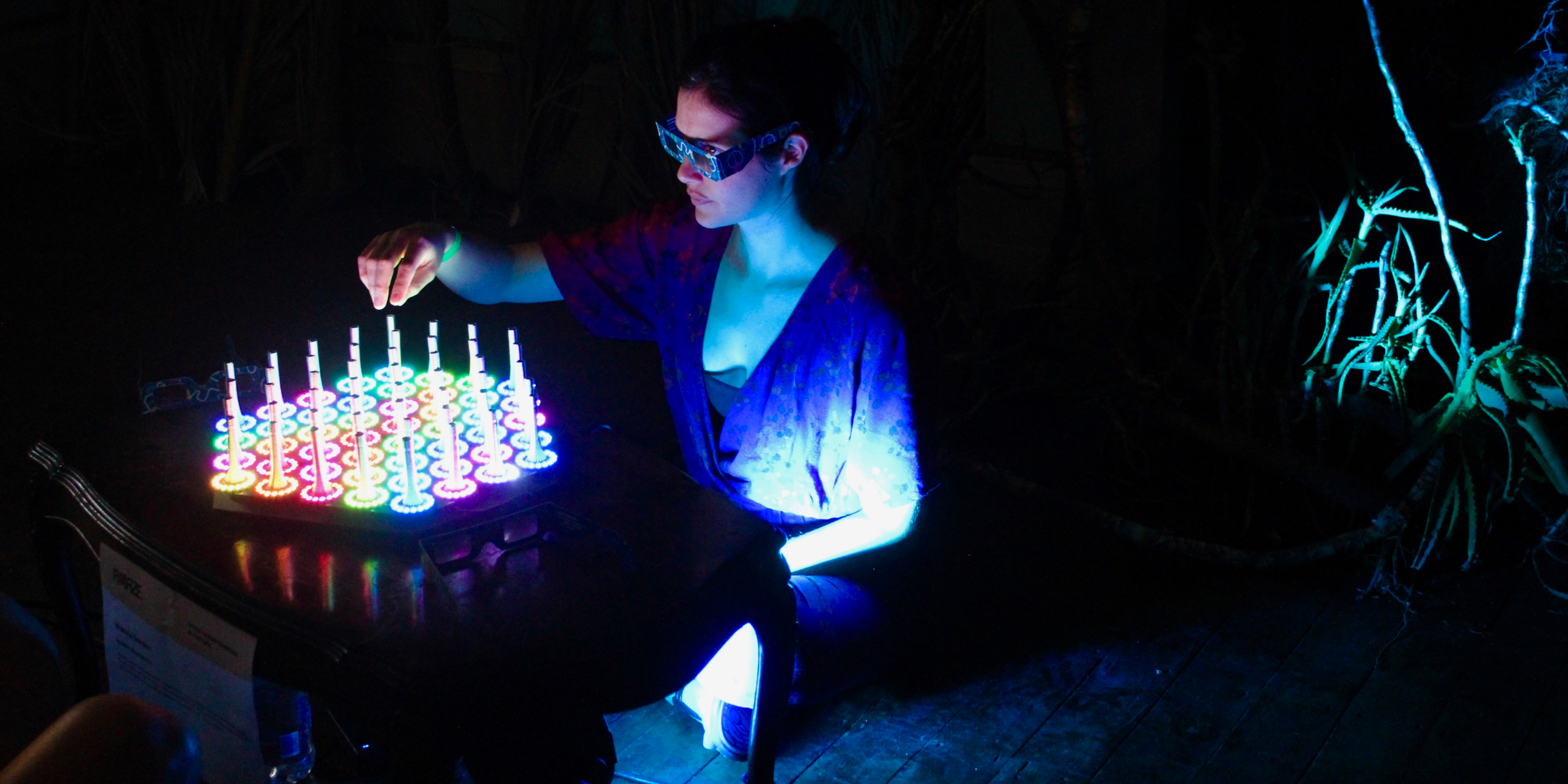
A festival goer plays a game in the “Digital Garden” installation at Playtopia. The installation combined the work of game developers and a botanical artist. Photo: Christi Nortier
Still in its formative years, the independent scene is acutely aware that it had better watch where it’s headed, and this was a central theme of Africa Games Week. Without such introspection, it might end up being a much more extreme version of the already unequal international game development industry.
The festival’s keynote speaker, Anita Sarkeesian, was one of the targets of an international social media campaign in 2014 that was launched to scare women off social media and away from game development studios. #Gamergate supporters attacked those who advocated for fairer representation of women in the industry, with some even receiving death threats.
In 2017, the International Game Developers Association still maintained that “while the overwhelming majority of game developers recognise the importance of diversity, game development as a profession can still be unwelcoming”.
The South African game development industry is dominated by white men who own 90% of the studios and make up 76% of employees.
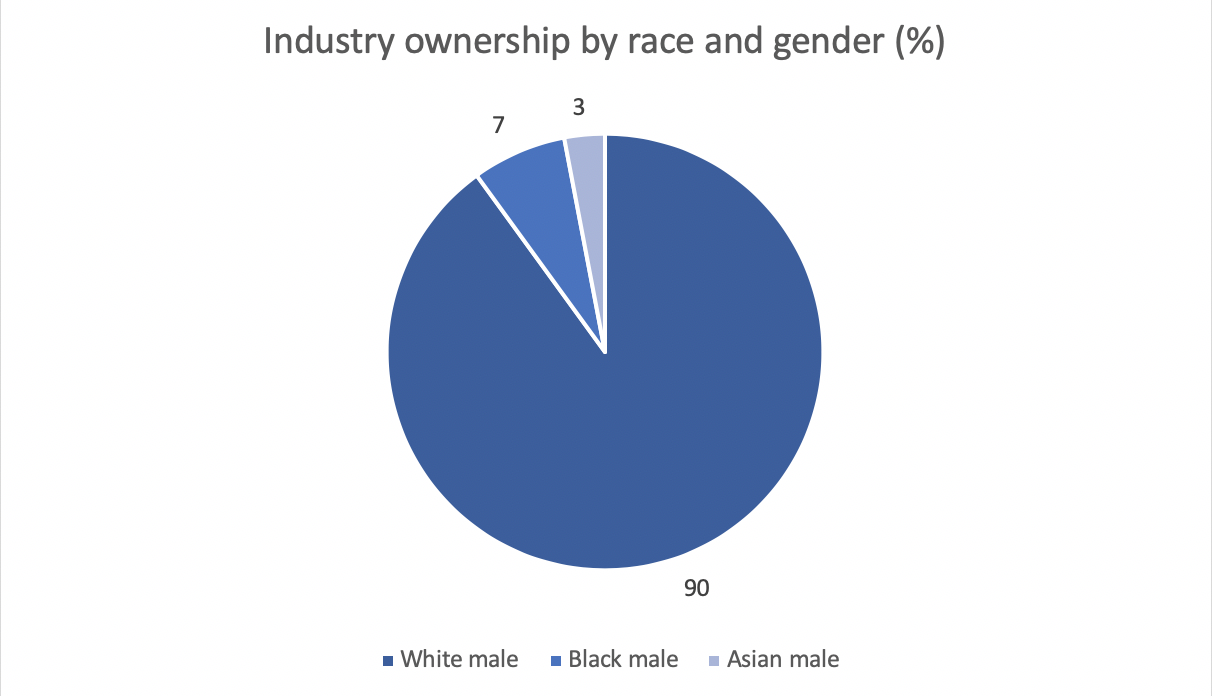
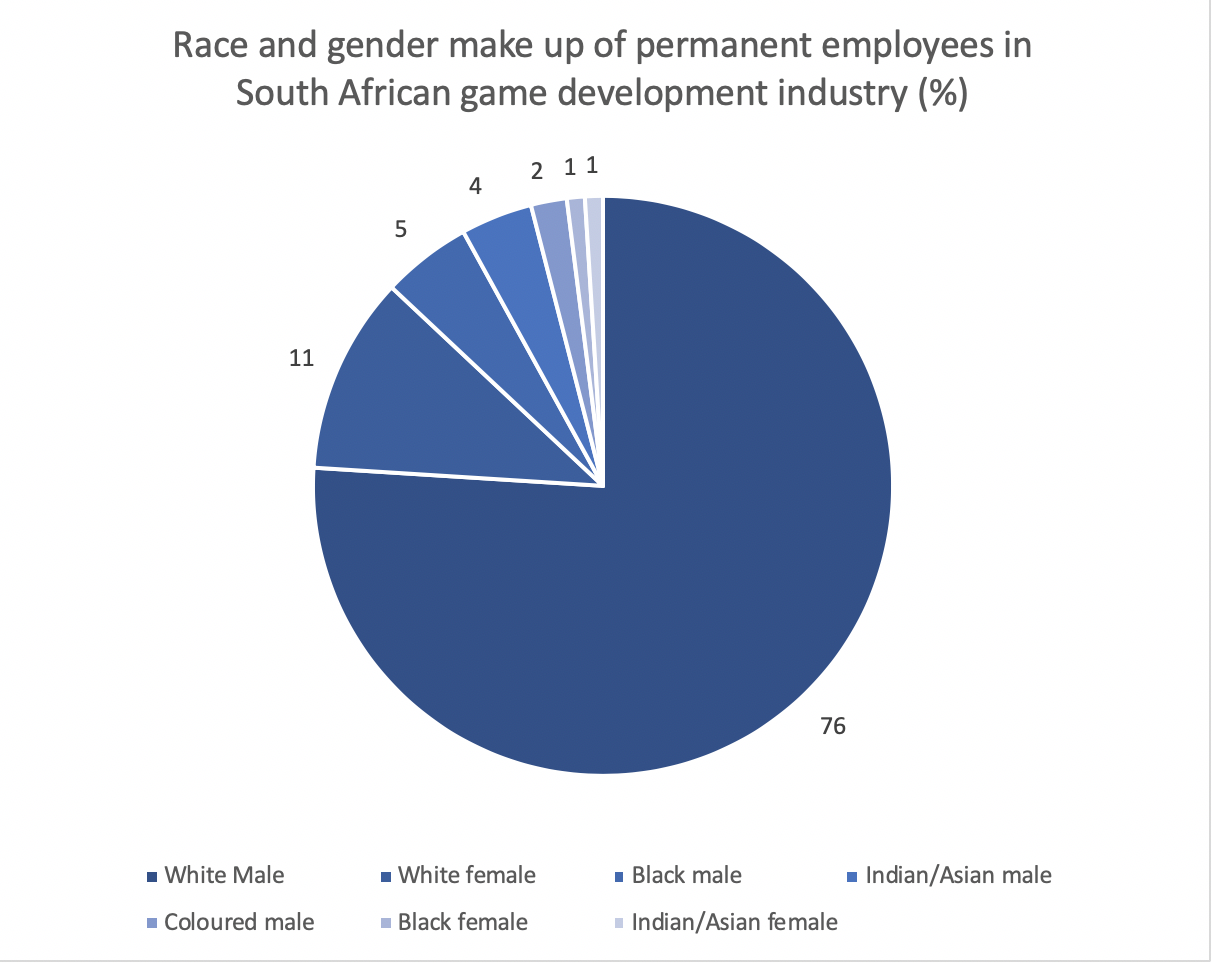
“I don’t know if you guys know the saying that developers take coffee and convert it into code; well in some sense my talk is about how I have taken the privilege that I have and converted it into code,” is the preface to Francois van Niekerk’s talk at the Playtopia festival about busting assumptions about independent game development.
Van Niekerk admits that just being able to pursue game development in the first place is a privilege, thanks largely to the fact that he is a white heterosexual male from a middle-class family who was able to dabble in independent game making for a few years before finding permanent employment in the industry.
“Failing is unfortunately almost a necessity in game development. A lot of other people come from a lot less privilege and are able to get into game development… It is still a very ‘white man-y’ industry,” he says.
Sithe Ncube, a computer science student and the sub-Saharan regional organiser for the Global Game Jam, addressed patriarchy head-on in her talk “Sisterhood: listening to women to empower minorities in tech”. She spoke of her experiences of hosting game development workshops just for women in Zambia, her home country, after she noticed the confidence of female developers shrinking in the face of sexism in the industry.
When comparing the communities of Zambia and South Africa, Ncube experiences a more open community in South Africa.
“Just like with Zambia, the game developer community in South Africa is clearly male dominated, but there are still more opportunities for women, and also more visible women, in the game development community in South Africa,” she explains.
“South Africa has additional challenges for those of different cultural backgrounds which can sometimes go hand in hand with differences in socio-economic backgrounds. But South Africa is also more open to the experiences of developers and artists of different genders and sexuality. Zambia is more conservative in this respect both socially and with our legislature.”
These already existing inequalities have not gone unnoticed. The Playtopia line-up was designed to specifically try to change the course of the fledgling industry by including speakers who are female and/or of colour. In addition, they added to the programme talks tackling issues of sexism and racism in the industry. The two keynote speakers were women who have risen to international fame for standing up for the right of those who are not white males to have a space in the game development industry.
A testimony to this ethos is their festival harassment policy, which takes a zero-tolerance approach to forms of harassment ranging from “verbal comments that reinforce social structures of domination” to “deliberate intimidation, stalking or following”.
Festival-goers could report any incidents anonymously to an always-on number and would be helped by festival organisers to find a safe space and contact any support they needed.
Festival organiser Dominique Gawlowski explains that the festival wants to influence the industry while it’s still malleable.
“Compared to other countries, South Africa in a way got a clean start in things. We are a nation which is really open to trying to do it right. It made sense that here we don’t say that if we do that then no one will come. We don’t actually care because this is how it’s going to be. We are open, accepting and welcoming,” she says.
Beyond the content of the festival, the organisers tried to include as many people as possible. They sponsored 60 people to attend the talks and not just the arcade, music and art installations.
Watch: Step inside Playtopia
“This space is not shut off because of what you can and can’t afford,” Gawlowski says.
“People mailed me and told me their story and that they would really like to attend the talks, but they cannot afford it. We told them to buy a day pass [R120-R180] and we would sponsor the rest [a delegate pass costs R820]. This is the community that we are trying to build here.”
The industry tends to be unforgiving.
“This is well known these days, but there is just no money in the game stand,” Van Niekerk says.
The number of active studios in South Africa is in a slow decline, reports Interactive Entertainment South Africa, an industry body which represents SA gaming businesses.
However, there are people in South Africa who do play, and buy, games. They have created a R3-billion industry, but who exactly is making the money is not known.
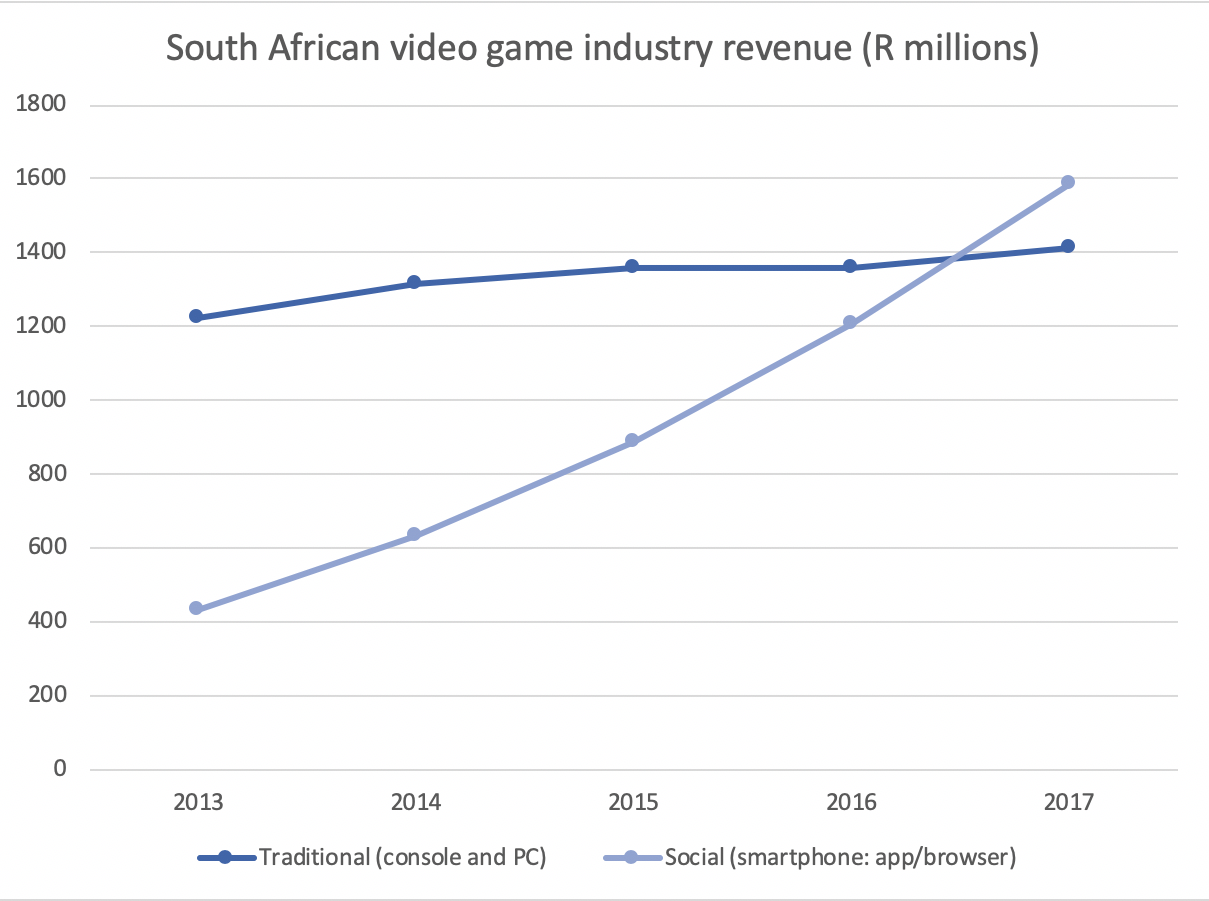
“It’s socially irresponsible to promote AAA gaming [high cost, long length and graphically complex games] to people. But with independent gaming, there’s plenty of space to make money and build the industry. It’s like an independent movie versus a major studio release. You don’t need to study to be in indie gaming. You can be a story writer, a producer, a graphic designer or a project manager. The industry needs all those jobs. A lot of people don’t understand that they can cross over into gaming,” explains Gawlowski.
“The industry in South Africa is unfortunately so that people that don’t fit that description [white male] can’t necessarily afford to go into game development. While I want it to be more diverse and I want people to come to game jams, it’s a bittersweet thing. I don’t want to give people advice that will lead them down a path that results in them having to get a loan or into debt to make a game which then fails. It’s a toss-up,” Van Niekerk admits.
This harsh reality is not unknown, but neither does it scare everyone away.
“I wish I could create my own game one day, but you know I need to learn the skills and have all the materials and tools to create a game. That’s why I’m here… I want to be part of it and learn more,” says Temba.
He was a sponsored delegate at the festival and tried every game and talk available. He says he plans to go into the marketing industry, but hopes to develop games on the side. Temba has experienced the love that kids have for games, so his goal is to create educational games to teach them more about their history.
“We, as South Africans, need to create our own games,” Temba says.
“We need to inspire the youth in the townships to come and see these things.” DM














 Become an Insider
Become an Insider